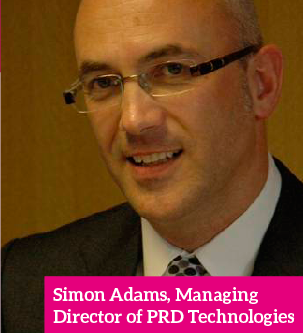
We work in a very dynamic market sector where the only constant is change but what has changed in the last 12 months for Billing Solutions? Here’s the answers.
Billing services and applications are still evolving just as the communications landscape evolves. Once just used for fixed line voice call billing applications, today they need to keep pace with the integration of voice and data applications such as VoIP and cloud based services as well as mobile communications.
Comms Business Magazine talks to the key players to see how they are managing this convergence play within a single solution and examines the implications for resellers.
 So what has changed in the last 12 months for channel billing solutions?
So what has changed in the last 12 months for channel billing solutions?
Vincent Disneur, Head of Sales for Union Street Technologies says the increasing possibilities and benefits offered through business support system (BSS) integration have been key drivers for change in their solutions over the past year.
“It is unquestionably the case that a joined up back-office solution, formed with ‘best-of-breed’ software packages from various suppliers, will deliver a host of benefits including a single point for data entry, reduced errors, up to date and synchronised data across all applications, and a reduced workload for administrative staff.
For most resellers, the billing platform will usually be the core revenue generating software in the business. It’s also usually the only software that’s been purpose built for use by resellers. It’s logical therefore that BSS integration should be structured around the billing platform to provide tight integration and business process management between software packages across the business, such as customer relationship management (CRM); accounts; credit management; service management; provisioning; support; and so on.
Creating benefits through BSS integration is something we continually strive for at Union Street and, to an extent, something we have already delivered through extensive integrations for Microsoft Dynamics CRM and Sage Accounts. In the last 12 months, we have developed integration with CreditSafe, one of the UK’s top credit checking companies. This provides numerous benefits for our clients for monitoring their customers’ credit status and for bringing on new business. We are also developing integrations with other leading software packages that will soon be launched to the market.
We have also been improving our API functionality for aBILLity to make it even easier to integrate with many third party back end systems, providing direct access to their services. This will deliver massive benefits for our clients for quoting, ordering and provisioning of next generation network services and feature enhanced options for configuring Ethernet services and supplementary services such as SIP and ISDN.”
Suzanne Chappell of billing firm tms says, “We are seeing change every day from Ofcom, most recently the NGCS change that require programming skills to get correct when you have hundreds of billing partners.
 Being in the position we are, billing various carrier data to various channel partners, we have seen the impact of this change and how badly this has been handled within the industry. We successfully and accurately rolled out this change to all our channel partners and have even had partners move to us because their previous billing partner was unable to do so.
Being in the position we are, billing various carrier data to various channel partners, we have seen the impact of this change and how badly this has been handled within the industry. We successfully and accurately rolled out this change to all our channel partners and have even had partners move to us because their previous billing partner was unable to do so.
You have to be nimble and agile in the industry to keep up with changes and implement each in a timely and accurate manner. We are able to do this as our billing software is in house and maintained by our own software developers. We quite often see resellers claiming to have their own software when in fact they are using an inflexible third party product that adds complexity when trying to keep up with an ever changing industry.
We load daily CDRs and monthly EDRs from multiple data suppliers and were the first to adopt the standard CDR format for traffic and services, many of our competitors and even carriers are yet to follow suit. And now the second version has been released!
A big change is the channel partners we are selling billing services to, mainly the IT sector, where they fully comprehend the technical aspect of cloud and hosted telephony but don’t fully understand the call, lines, products, services and bundles or the concept of billing all on one invoice and direct debit collection monthly. Not just a huge change for the IT industry but a big learning curve for both sectors - and they are merging into one.”
Tony Poulos, Market Strategist at WeDo Technologies, believes that billing solutions that have been used primarily for post-paid billing have not changed radically, if at all, in the last twelve months – with one exception.
“Most have been ‘opened up’, primarily using APIs, to allow for Direct Operator Billing services to be extended to third parties, partners, etc. While telecom operators have traditionally guarded the billing ‘crown jewels’ from outsiders, they now see an opportunity to recover some of the substantial investment they have outlaid over the years for incredibly complex billing scenarios around voice and data.
Operators have also invested in real-time or online charging systems not only for their pre-paid customer base but also to be able to provide access to these customers, and their balances, to third parties. These are not simply debtors’ ledgers any more but act as accounts payable systems as well, keeping track of product and service costs, variable mark-ups and margin management - all necessary when selling or billing on behalf of others.
Major billing vendors have come to the fore by offering cloud-based solutions primarily to offer a low entry cost ‘proof of concept’ or additional capability that can later be expanded virtually or brought in-house if desired. A slew of new vendors have also sprung up offering anything from simple subscription models to integrated charging and catalogue platforms.”
Can resellers really handle the converged billing requirements of their customers or should they outsource to experts?
 Vincent Disneur at Union Street Technologies, “Telecoms is an industry that will always have a steady influx of disruptive technologies however, so long as your billing platform is continually developed with tools to manage and capitalise on these technologies, a skilled billing manager should have no problem adapting with the pace of change. Managing the billing in-house will to some degree provide additional control over this critical process however, experienced billing managers can be expensive and difficult to find.
Vincent Disneur at Union Street Technologies, “Telecoms is an industry that will always have a steady influx of disruptive technologies however, so long as your billing platform is continually developed with tools to manage and capitalise on these technologies, a skilled billing manager should have no problem adapting with the pace of change. Managing the billing in-house will to some degree provide additional control over this critical process however, experienced billing managers can be expensive and difficult to find.
For many resellers it makes more sense to use an outsourced bureau billing service as opposed to managing their billing in-house. A good bureau billing service will also enable a reseller to draw on the expertise of a whole team of experts as opposed to relying on just one person in-house. It also removes the potential for difficulties that will inevitably arise due to sickness or leave.
For CPs that choose to manage their billing in-house, it is vital to make sure that adequate training is available from the supplier of their billing platform to ensure staff have all the knowledge and support they need to conduct billing runs accurately and effectively.
One of the things we have introduced in 2015 is our Union Street Accredited Professional (USAP) qualification which provides training on our aBILLity platform for beginners all the way through to expert level. Our training programme is made up of courses which can either be taken in isolation or as part of the accreditation, and aim to educate clients not just on our solutions but also on the best practices to deploy to ensure profitability, professionalism and compliance with industry regulation. The USAP qualification provides our clients with a very cost effective means of up-skilling their billing personnel and offers assurance of competency in this vital area.
From a purely economic standpoint, choosing a bureau service is cheaper than employing an in-house billing manager when companies have lower revenues but, when monthly revenues grow to a significant level, there may come a point at which the door begins to swing the other way. Identifying where this point lies is not an exact science, and a bureau service provides many additional benefits such as disaster recovery and resilience against sickness, death, and other unforeseen circumstances. The value of this can be difficult to quantify but, it’s certainly safe to say that choosing if or when to switch from bureau to self-managed, should be viewed as more than just a simple cost exercise.”
Shaun Bodsworth at Inform Billing believes on the whole resellers can handle converged billing requirements.
“Professional billing software, such as our Eclipse platform, takes the pain out of billing a variety of converged products. Many resellers choose to manage their own billing to maximise their control, visibility, improve profit margins and increase customer satisfaction.
However, it really depends on the resellers themselves and if they have the resource internally - someone who can learn to understand and utilise the full feature-set of the billing platform. Early on a reseller may find that this responsibility detracts attention from a primary role.
At Inform Billing we offer a full-featured bureau service that has proved very popular with start-up resellers, yet our company ethos is to help resellers to be self-sufficient wherever possible, through providing high levels of support and training.
We have a three-tiered approach and so also offer a half-way house. Our ‘Outsourced Billing Manager service’ is essentially the best of both worlds; access to a fully featured professional billing platform, yet when the monthly bill cycle comes around it is handled by our experienced and knowledgeable billing team.
 Often these managed services are taken for the short-term, allowing time to equip the reseller with the relevant skills and expertise to manage their billing on an on-going basis, safe in the knowledge that we are behind them.”
Often these managed services are taken for the short-term, allowing time to equip the reseller with the relevant skills and expertise to manage their billing on an on-going basis, safe in the knowledge that we are behind them.”
Bodsworth believes the key here is choice, “No one solution fits all. Some resellers may prefer to outsource entirely whilst others prefer to maintain a greater degree of control in-house but benefit from the experience and expertise of a professional billing partner. The challenge here is less about convergence but more about having the right support mechanisms - partnering with a company who will give the advice and assistance needed as the market continues to converge.”
Are cloud based pay as you go solutions the way ahead for resellers?
Vincent Disneur at Union Street Technologies says that like all software applications, billing solutions will increasingly be available in the cloud on a SaaS model with all the usual benefits such as disaster recovery, accessibility, reduced cost of infrastructure and maintenance, and so on.
“Since introducing aBILLity Cloud, a cloud based variant of our aBILLity software, we have seen tremendous uptake from clients of all sizes and it is currently used by close to 150 resellers. We fully expect this service will become more popular as time goes on but cloud won’t necessarily suit all customers. Some need to retain complete control over their data centre and over its security. Client choice is paramount, so we will continue to offer aBILLity both as a cloud or on-premise solution and be adaptable to client requirements.
Perhaps one of the biggest advantages of cloud is its scalability. The ability to scale up elasticity in resources, storage and processing power at times of peak demand and then decrease them again, lends itself well to billing environments. Union Street has been putting a big investment into adopting this type of technology, designing scalability and elasticity into our core applications, to complement our proven functionality set. Naturally we’re also embedding it into new generations of our products and have recently recruited a Head of Cloud, David McGrath, to oversee the continued development of Union Street’s cloud solutions.
Whether or not a ‘pay as you go’ model is truly of benefit for resellers is questionable. Elasticity in computing resources is ideal, but elastic pricing based on this usage could be problematic if increased usage doesn’t equate to increased revenue or margin. We believe that a pricing model based on revenue percentage will continue to be the fairest, most predictable model and one that resellers will prefer.”
Suzanne Chappell at tms says, “Our billing solution has been cloud based since launched into the industry in 2001 therefore unlike some we are not now trying to develop web based software from a historic code never designed to work in this environment, then left having to run two platforms- a legacy based platform and cloud based solution.
We believe and always have believed in this principle, being cloud based enables us to release a new piece of functionality instantly to our partners, we can be agile and very cost effective as our partners require no hardware or expensive equipment – web access from anywhere can access our billing platform.”
Market Snapshot
Simon Adams, Managing Director of Basingstoke based billing firm PRD Technologies, says he finds that the larger CSPs (wholesalers, large resellers) want to maintain full control, but new entrants, smaller or mid-sized resellers prefer cloud-based solutions.
“This trend has increased over the past 12 months. But even the larger ones are now adopting PRD’s cloud based solutions in increasing numbers, often meaning they can free up their own IT infrastructure resources to focus on other parts of the business, like marketing and sales.
With zero or low capex costs, resellers will find it is generally easier to get up and running more quickly with the cloud based QuickStart Billing solutions. However, with the more advanced and bespoke QuickStart Pro versions of the platform, the customer has the option to use their own data centre if they prefer. All options are available and it’s for our customers to decide which solution is best for them.
In the last year there has been a constant flow of developments made to our products by our in-house development team. The users of today are far more exacting in their requirements than in previous times and with our ability to provide bespoke customisation we are well placed to meet this demand – in fact we have several large projects in play.
The top three interests for users of billing solutions are price/commissions, functionality and support.
We say that any billing solution should be simple – just a few clicks to get going and this explains the market drop off in demand for managed billing services. Once we have demonstrated how easy it is to use QuickStart users realise they can easily do it themselves.
Larger resellers often require additional features to meet their specific needs and looking ahead I believe the market increasingly wants billing systems with simple yet comprehensive user interface with more and more automation of processes.”
Ed Says…
Billing applications is yet another area where cloud based solutions are making inroads in to the market and who can blame users of this OPEX deployment choice for going for what Simon Adams at PRD describes as an application that should be as simple as ‘just a few clicks’. It is the larger, Mid-Market and up resellers that are still going for the traditional CPE supply model. So pick a supplier that has both.
